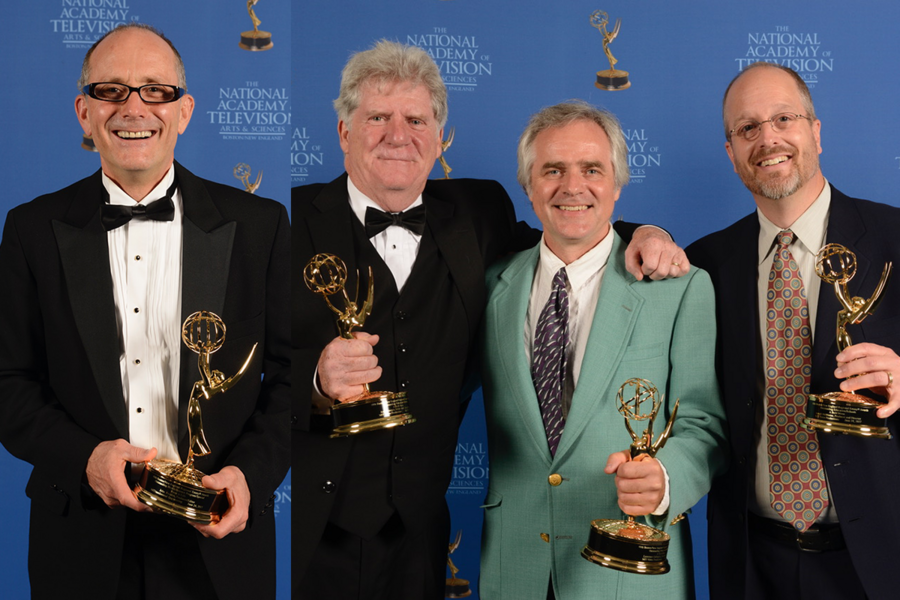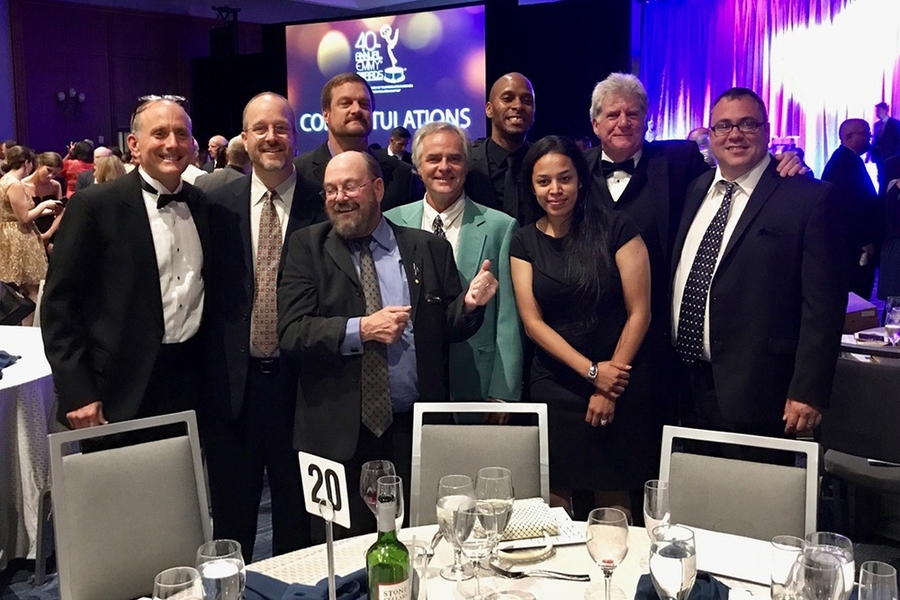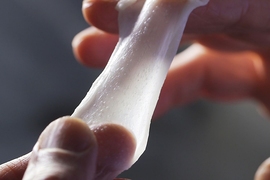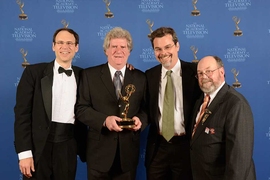On June 24, Boston-area journalists, videographers, and producers filled the halls of the Marriott Boston Copley Place for the 40th annual New England Emmy Awards. Staff from MIT’s Department of Mechanical Engineering (MechE) and MIT Video Productions (MVP) occupied two full tables at the black-tie affair. By the end of the night, two golden statues joined them as both groups were awarded Emmys.
MechE’s multimedia specialist John Freidah was honored with a New England Emmy in the Health/Science Program/Special category for the film “Water is Life,” which chronicles PhD student Natasha Wright and Professor Amos Winter as they travel to India gathering research on how to design a low-cost desalination system for use in developing areas. The film was also recently honored with a 2017 National Edward R. Murrow Award — one of the most prestigious awards in journalism — as well as a 2017 Circle of Excellence Award from the The Council for Advancement and Support of Education (CASE).
Meanwhile, MVP’s Lawrence Gallagher, Joseph McMaster, and Jean Dunoyer received a New England Emmy in the Education/Schools category for their film “A Bold Move,” which recounts MIT’s relocation from Boston’s Back Bay to a swath of undeveloped land on the banks of the Charles River in Cambridge, Massachusetts. The film is the first in a four-part series that commemorate MIT’s 100th year in Cambridge.
"Water Is Life"
As the camera pans over an aerial shot of a lake in India, a flock of white birds majestically flies by. Capturing this moment in the opening shot of “Water is Life” required a lot of patience and a little help from a new friend. Unable to bring a drone into India, the film’s producer, editor, and cinematographer, John Freidah, had to come up with another plan. During a conversation on a flight from Delhi to Hyderabad, Freidah befriended a passenger in his row. He mentioned his search for a drone operator to get the perfect birds-eye-view shot of India’s landscape. As luck would have it, the day before departing India, Freidah received an email from his new friend saying he knew someone with a drone that he could use to film sweeping aerial shots.
Planning for “Water is Life” began months before Freidah flew to India, however. Interested in highlighting the important work done in Professor Amos Winter’s Global Engineering and Research (GEAR) Lab, Freidah and his colleagues in the media team at MechE honed in on the research PhD student and Tata Fellow Natasha Wright was conducting on designing an affordable desalination system for use in rural India. With the generous support of Robert Stoner, deputy director of the MIT Energy Initiative and director of the Tata Center for Technology and Design, plans were arranged to film Winter and Wright in India.
“India is a beautiful and amazing country, which is rich in imagery. I felt lucky to film there,” Freidah says. “We were fortunate to have the aid of stakeholders — Jain Engineering and Tata Projects — who facilitated our visits to the local villages where they were struggling with clean drinking water.”
Visiting these villages and talking to end-users who would benefit from and potentially use a desalination system was a crucial component of Winter and Wright’s research. Capturing the daily challenges these villagers face on film brought another level of exposure to the work being done by GEAR and the Tata Center.
“Having John travel to India enabled us to tell the story of our research in much greater depth than we could on campus,” says Winter. By capturing the many angles of Winter and Wright’s story, “Water Is Life” aims to show people first-hand what a problem access to clean water is on a global scale, and how essential it is to support new research and technologies that hope to solve it.
“I really wanted to give the viewer a first-person experience — through the visuals,” Freidah explains. “I wanted it to be a visual journey, as if they were there — with sound and imagery — from honking horns on the street and rickshaws going by.”
"A Bold Move"
It’s hard to imagine a time when the banks of the Charles River in Cambridge weren’t adorned with MIT’s Great Dome, inter-connected buildings, and stately columns. MIT President Richard Cockburn Maclaurin’s aspiration to move the Institute from its overcrowded classrooms in Boston’s Back Bay to a plot of vacant land across the river in 1916 did more than shape the landscape around Kendall Square; it redefined MIT’s presence as a global pioneer in science and technology research. To celebrate the 1916 move to Cambridge, the program A Century in Cambridge was launched last year.
Well before the centennial fireworks exploded over Killian Court, Larry Gallagher, director of MVP, was approached by the Century in Cambridge Steering Committee. MVP was asked to produce a series of documentaries that explored MIT’s move to Cambridge in 1916 and other key aspects of the MIT experience that have helped shape MIT into what it is today. The first of this series, “A Bold Move,” chronicles the design and construction of MIT’s new campus, the whimsical celebrations commemorating the move, and the tragic and untimely passing of the man who orchestrated the entire process — President Maclaurin.
Capturing this period in MIT’s history required extensive research and the participation of faculty, staff, and historians well versed in the move to Cambridge. “We are deeply indebted to the faculty, staff, alumni, and members of the Cambridge community who so generously gave their time end expertise,” says producer and director Joe McMaster. “Without their insights, the film wouldn’t have successfully portrayed this moment in MIT’s history.”
In addition to interviewing those with extensive knowledge of the 2016 move, the MVP team had to dig deep into MIT’s robust archives. Thousands of photos from The MIT Museum, The Institute Archives, the Cambridge Historical Commission, and other sources were analyzed by McMaster and a team of research assistants. “I was amazed to see how thoroughly documented MIT’s history is in photographs — particularly everything to do with the move to Cambridge,” McMaster adds. “The whole affair seemed to be carried out with such a wonderful mixture of seriousness and whimsy, and I hoped the film would capture that feeling.”
Editor and co-producer Jean Dunoyer was tasked with weaving together the footage and photographs in a way that reflected this mixture of the silly and sacred. The imagery and footage was set to period music, to give viewers a feel for that particular era in history. In one of the concluding scenes, this period music is brought to life once more by MIT a capella group The Chorallaries. The group performs a haunting rendition of “Mother Tech,” a piece originally performed at the conclusion of the celebrations in 1916.
The entire Century in Cambridge documentary series was produced over the course of 18 months, with assistance from the Century in Cambridge Steering Committee and the generous support of Jane and Neil Papparlardo '64. The scope of “A Bold Move” required a massive collaboration across all of MVP. “This is indeed a huge collaborative effort for MVP,” says Gallagher. “Projects of this scope benefit from the contributions of the entire team, and for their work and talents to be recognized by their peers in the video production community with an Emmy is a great source of pride.”










